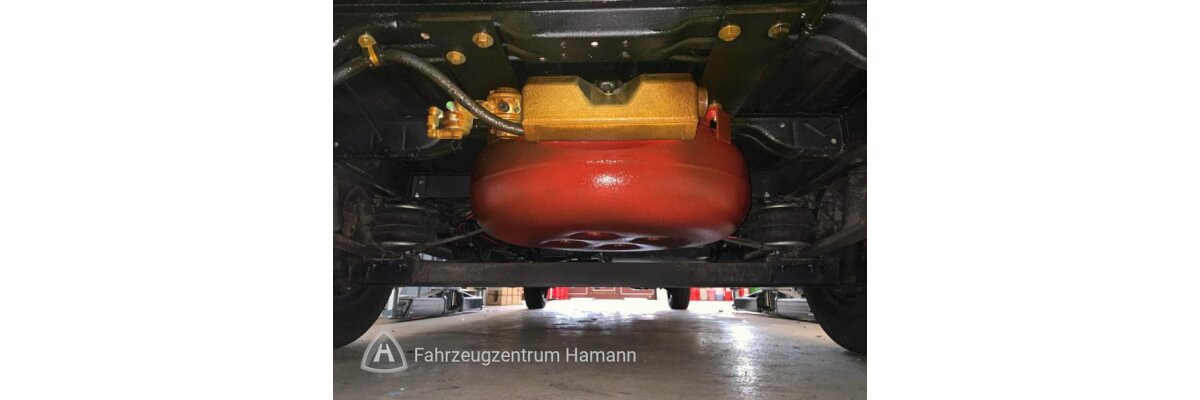For many people, motorhomes and caravans are the epitome of freedom and adventure. But to ensure that the journey remains safe, regular inspections of the LPG systems are essential. Liquid gas is often used in these vehicles to operate appliances such as fridges, heaters or hobs. There are clear legal regulations to minimize risks. Here you can find out everything you need to know about gas testing, the requirements for LPG tanks for motorhomes and caravans and their costs.
Why is a gas test necessary?
The regular inspection of LPG tanks in motorhomes and caravans is primarily for safety reasons. It ensures that there are no gas leaks or technical defects that could lead to accidents. Regulations such as the G 607 test for motorhomes and caravans aim to prevent accidents caused by leaking LPG conversion kits. These tests are required by law and must be carried out at set intervals.
Is the gas test for motorhomes and caravans mandatory?
Yes, gas testing is required by law for LPG tanks in motorhomes and caravans. The so-called G 607 test must be carried out every two years. Recently, this regulation no longer only applies to motorhomes, but also to caravans.
The gas test is independent of the main inspection (HU). It can be carried out by certified specialists, including inspectors from TÜV, DEKRA, ADAC or workshops certified by the German Liquid Gas Association (DVFG).
Transition period for previously untested systems
If you have not yet carried out a gas test for your vehicle, there is a transitional period until June 19, 2025. By this date, all LPG tanks in motorhomes and caravans that have not yet been tested must be retrofitted accordingly.
What are the fines for failing to do so?
Anyone who ignores the legally required gas test or has it carried out late can expect to be fined. The amount of the fine depends on how long the deadline is exceeded:
- 15 euros: If the deadline is exceeded by 2 to 4 months
- 25 euros: For a delay of 4 to 8 months
- 60 Euro: If more than 8 months late
In addition to the financial consequences, a missing inspection also represents a safety risk.
What is checked during the gas test?
The inspection of a LPG tank for motorhomes and caravans covers several aspects:- Tightness of the system: special equipment is used to test whether the LPG tank is completely tight
- Safe condition of the seals and valves: these are checked for cracks, wear or other damage
- Installation and securing of the gas cylinders:
- a maximum of two cylinders of 11 kg each are permitted
- The cylinders must be securely lashed down in a tight gas locker
- Ventilation of the gas locker:
- The gas locker requires an opening (at least 10x10 cm) that leads to the outside at the lowest point
- This ventilation ensures that heavier gases such as propane and butane can escape
- Electrical fuses and appliance function: All gas-powered appliances are tested to ensure that they function properly
Important: Test certificate
After a successful test, the acceptance is documented in the yellow test booklet. This should always be kept in the vehicle, as it will be needed for inspections or follow-up appointments.
What is particularly important for LPG tanks in camper vans?
Camper propane tanks differ from conventional gas cylinders in a number of ways. They are permanently installed in the vehicle and are subject to specific regulations:
No 10-year inspection required
Unlike gas cylinders, camper propane tanks for motorhomes and caravans with ECE 67R-01 certification do not have to be replaced after 10 years. These tanks do not have a fixed service life. However, their safety is checked as part of the general inspection. If defects are found, replacement may be necessary.
Entry in vehicle documents
Once an LPG tank has been installed, it must be approved by TÜV or a comparable body. Only then is it entered in the vehicle documents. Without this entry, the tank is not insured and the vehicle's road registration is invalid.
How much does a gas test cost?
The cost of a gas test for LPG tanks for motorhomes and caravans varies depending on the provider:
- TÜV: 50-70 euros
- DEKRA: Around 50 euros
- ADAC: 29 euros for members, 36 euros for non-members
- Other test centers: Between 30 and 70 euros
If the gas test is carried out as part of the general inspection or together with a leak test, additional costs of around 50 euros may be incurred. Some providers also offer complete packages.
Conclusion: Safety first
Regular gas testing is not only a legal obligation, but above all an important measure to ensure the functionality and protection of motorhomes and caravans. In addition to ensuring compliance with regulations, it also protects against unnecessary fines and potential dangers.
Schedule the inspection in good time and make sure that your yellow inspection booklet is always up to date and ready to hand. With a safe and inspected vehicle, nothing stands in the way of your next trip!

